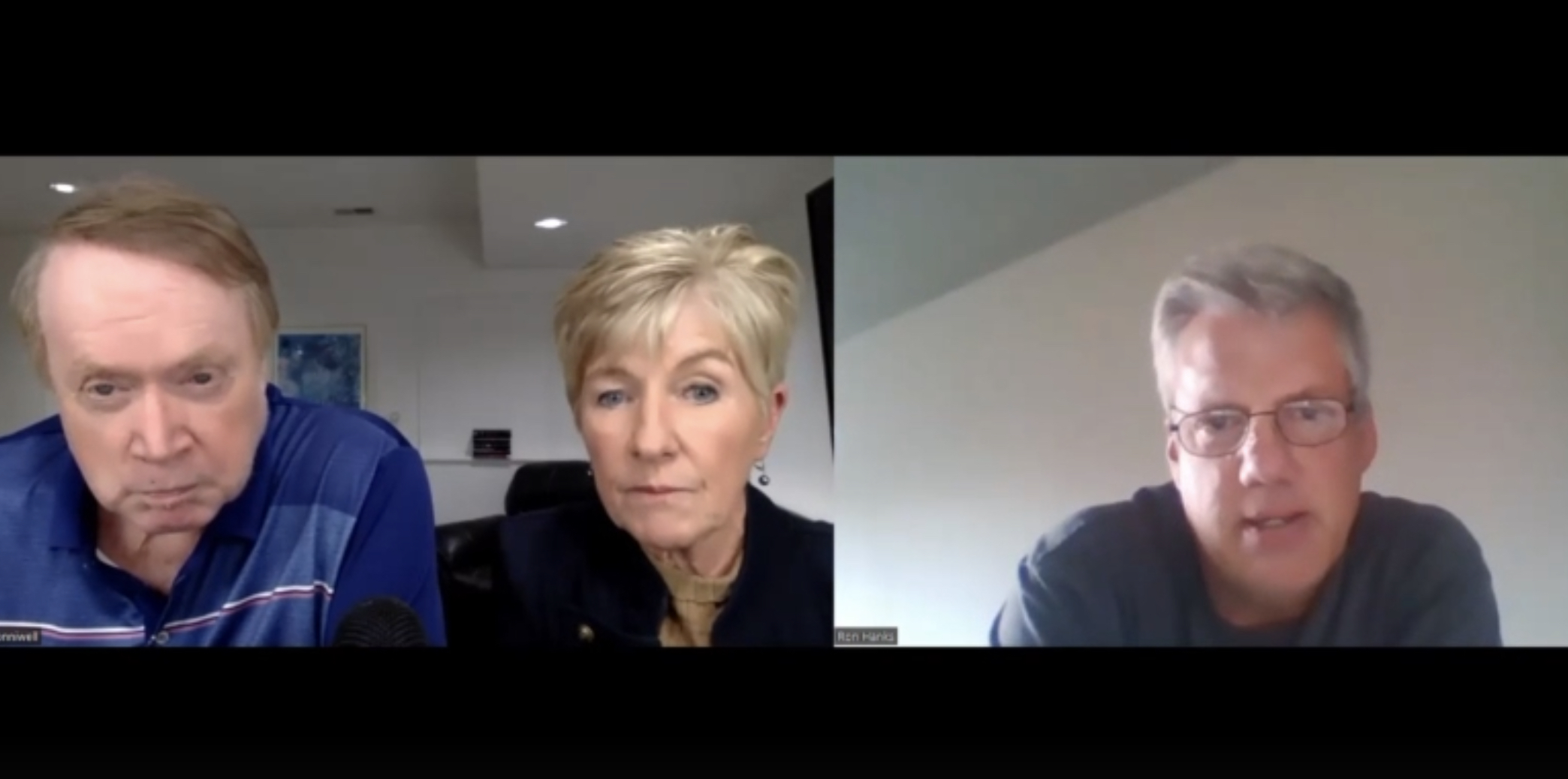The Colorado GOP’s new point man on election integrity, notorious election denier Ron Hanks, who kicked off his efforts by telling the Republican members of local election boards to refuse to sign off on certifying their county election results, escalated his rhetoric recently by calling Secretary of State Jena Griswold Hitler. He also convinced five local party chairs, four of whom represent some of the largest counties in the state, to refuse to certify the election results.
Appearing on the Chuck and Julie podcast last week, Hanks reiterated his call for canvass board members not to sign the certification documents. He then dismissed the positions entirely by saying their duties are only to praise the secretary of state, whom he called Hitler, ostensibly because of rules Griswold passed in 2021 that Hanks says restricted the roles of canvass members.
“I cannot recommend to any canvass board member that they sign it,” said Hanks. “Here’s why: it is outside the scope of their duties, because their duties have been narrowed down to praising and heiling the Hitler in the secretary of state’s office. So really, the point is we’ve got to be on record that these elections are still as flawed as we discovered they were in 2020.”
Despite his official title, which is Colorado GOP Ballot & Election Security Committee Chairman, Hanks is likely aware that his call to action is strictly performative. Election results can be certified with just a majority of the canvass board members, meaning that the county clerk (who more often than not in Colorado is a Republican) and the Democratic Party member can certify even without the GOP member’s signature.
That said, at least two county GOP Chairs have followed Hanks’ instructions. Chair of the La Plata County Republicans Shelli Shaw refused to sign her county’s election results, as did Jefferson County Chair Nancy Pallozzi. La Plata Clerk Tiffany Lee told the Durango Herald that Shaw’s refusal was a first in her 27-year career as Clerk & Recorder. Pallozzi explained her reasons for refusing to sign in a Nov. 28 letter to JeffCo Clerk Amanda Gonzales.
Reached for comment, Secretary of State Griswold offered the following response.
“Ron Hanks’ comments are offensive and dangerous.,” said Griswold in a statement. “In a time when vitriol is on the rise, Colorado GOP leadership continues to spread conspiracies to undermine elections in our State.
“Colorado’s elections are safe and secure. These efforts by election deniers will not work. Election officials and Canvass boards signed off in all 64 counties. I commend the election workers for their work.”
The SOS office also confirmed that Republican canvass board members did not sign their county canvass in five counties: El Paso, Jefferson, Boulder, Larimer, and La Plata counties. In each case, a majority of the canvass board signed off and submitted the canvass to the Secretary of State’s office.
Besides La Plata, the four Front Range counties are all among the seven largest in the state. Their combined population totals over two million Coloradans. Furthermore, El Paso (the largest county in the state), Larimer and La Plata are all administered by Republican clerks.
Reached for comment, a spokesperson for Jefferson County Clerk Amanda Gonzalez responded to Jeffco GOP Chair Pallozzi’s stated reasons for refusing to sign.
“Chair Nancy Pallozzi has been very involved in our work in the Clerk & Recorder’s office and even sits on our Advisory Committee,” says Clerk Gonzalez. “She participated in the Logic & Accuracy Test certifying our election equipment before the election, which she did sign off on, and in our post-election Risk-Limiting Audit, which she also signed off on. It was disappointing that she opted not to certify the results after having been a supportive partner throughout this election; she did share her concerns with us in a memo after the canvass was completed.” Read the Pallazzi’s full list of objections as well as Clerk Gonzalez’ response at the bottom of this article.
A former state representative who participated in the Jan. 6 insurrection, Hanks is perhaps best known for a campaign ad from his failed primary run for U.S. Senate featuring him shooting at an office printer with the label “Dominion Voting Machine” on its side.

When election denier Dave Williams took the reins of the Colorado Republican Party, he initially offered Hanks’ position to former Mesa County Clerk Tina Peters, who said she’d consider the offer. Peters ultimately didn’t take it, possibly because her multiple felony indictments for election-related crimes require her full attention.
Hanks also praised Williams for his support both personally and for the “election security committee’s activity.

“I’ve got to give a lot of credit to the party chair Dave Williams, for supporting me, supporting the committee on this, supporting the investigations,” said Hanks. “I’ll just say there was none of that from any of the previous people in the previous administration.”
Hanks isn’t the only election denier to celebrate Williams’ commitment to the cause. Former Army intelligence officer Seth Keshel, an election conspiracist who tours the country giving unfounded Powerpoint presentations, also praised the GOP Chair following an “Election Summit” event in Parker last week, at which both Williams and Keshel spoke.
“Colorado has a lot of problems, but the new GOP chairman isn’t one of them,” posted Keshel on Telegram. “I’m watching him speak right now and am thoroughly impressed. Thought I would have to twist his arm on Colorado’s Petri dish of election failures, and he is straight-up shedding the system top to bottom, trashing the corrupt in both parties, and painting an accurate picture of where society is headed if we don’t get things fixed quickly. Dave Williams – remember the name.”
Hanks did not respond to an email asking who else sits on his committee, how long he has served as chair, and how many county election board GOP members refused to sign off on their results certification. This article will be updated with any response received.
Jefferson County Republican Chair Nancy Pallozzi’s reasons for not certifying the election results, followed by response by Jefferson County Clerk Amanda Gonzalez.
Jeffco GOP Chair Nancy Pallozzi Canvass Board Minority Report:
As my first year of observing the Jefferson County Elections as Chair and member of the Jefferson County Canvass Board, I want to begin by saying that my experience was exceptional and the entire staff at the clerk’s office was always kind and willing to answer any questions I had for them. Thank you. I know that the Jefferson County Clerk’s office takes tremendous pride in their procedures, protocols, and chain of custody of ballots once they are received and it shows. However, there were many things that I witnessed that gives me reason to Not Certify the 2023 election.
Some of the reasons below are procedural, that could be changed to bring more transparency to our elections.
1. The duplication process is flawed. Although this is a small percentage of ballots; in close races, this could make a difference. lobserved numerous times the election judge that received a ballot that had an overvote simply left it blank, when duplicating the ballot exactly. Therefore, what was once considered an overvote, was changed to an undervote. So, the CPR does not match with what is factual in this year’s election.
2. Signature Verification. There is not a bi-partisan team that observes the signatures for round one. There is one judge for each tablet. I observed many times, where the signature did not match in any way and should have been pushed over to the second non-partisan team, but was not, and accepted by the judge. This has always been a questionable step in every election.
3. The undeliverable ballots. Why is there not a chain of custody procedure in place, with a bi-partisan team, and a report of them for data? Instead, they are in bins on the wall open to everyone. And why doesn’t the image verification team look at them after the election and make changes to your voter records? From what I saw, there are approximately 20,000 ballots along that wall. Many of the envelopes I looked at were change of addresses that have moved out of state. Why are these not sorted through after every election to help with the cleaning up of the voter rolls instead of just putting them in the data as undeliverable or failed to vote status, which may make them inactive or continue to be active and receive ballots.
4. In an effort to help with voter confidence and showing that the tabulators are not set up to any internet, perhaps exposing the wires so they can be audited by a bi-partisan team. El Paso County Clerk has a perfect example of how to do this. It seems it could be done with a little effort and not cut into your budget. And with this possible change, it could help us with the validity of the dominion software, as that still comes into question at ever election.
5. The RLA is a required step that every county is required to do; however, the random sampling of the ballots pulled from the sealed boxes were computer generated and focused on two races, Prop HH and Lakewood City Mayors race. A true random sampling should be from bi-partisan teams, not connected with the clerk’s office, not a computer-generated sampling, and the canvass board is given the opportunity to choose two races, one statewide and one within the County. For me, Prop HH and Arvada City Mayors race should be the two to choose in the November 2023 election.
Response from Jefferson County Clerk Amanda Gonzalez:
Our canvass board is responsible for accounting for each ballot cast, making sure we didn’t count more ballots than were cast and that there weren’t more ballots cast than we have voters. We held our canvass last Tuesday, November 29, and none of our canvass board members shared any concerns about the accuracy of the results during the proceedings.
Chair Nancy Pallozzi has been very involved in our work in the Clerk & Recorder’s office and even sits on our Advisory Committee. She participated in the Logic & Accuracy Test certifying our election equipment before the election, which she did sign off on, and in our post-election Risk-Limiting Audit, which she also signed off on. It was disappointing that she opted not to certify the results after having been a supportive partner throughout this election; she did share her concerns with us in a memo after the canvass was completed.
It’s clear from her memo that there are a few misunderstandings about our processes that we can address with her to increase her confidence in our elections:
- Duplication processes absolutely do not change the outcome of any races. There is understandable confusion about overvotes (making more selections than is allowed in one question) and undervotes (making fewer selections than is allowed in one question) and how duplication may affect how they are recorded in the cast vote record, but any statements about duplication making a difference in outcomes is incorrect.
- Returned ballots are sorted through to adjust voter rolls. State law requires we wait until a voter has failed to vote in two subsequent federal elections before their status is changed in the voter database. We receive regular updates from a variety of data sources and are constantly updating the voter rolls with new information.
- The RLA process is based on a statistical model that is easily misunderstood, but its science is rigorous and Colorado was the first state to begin using it statewide. There is a misconception that the RLA is akin to a mini-recount and so the choice of the local race should be one with small margins. However, the only thing the local race determines is the number of ballots required to be audited. The list of ballots that is randomly selected is from across all ballots, meaning there are many audited ballots from voters who do not live in either Lakewood or Arvada and have neither of those mayor races on them. When we audit the ballots, we are also reviewing every single vote for each question on them, not just the two assigned by the state. Selecting the Arvada mayor race instead would have changed nothing about the process or what was reviewed except requiring about 30 times more ballots and a couple additional weeks, which would’ve cost taxpayers significantly more in staffing costs.
Nancy was clear in her memo that most of her concerns involve processes that are controlled by the state legislature or Secretary of State, not Jeffco individually, but we stand by our elections as the most secure in the country. Everything we do and the way we do it is rigorously scrutinized before and after each election, and we invite anyone who wants a closer look to come for a tour and see every step in the process.




